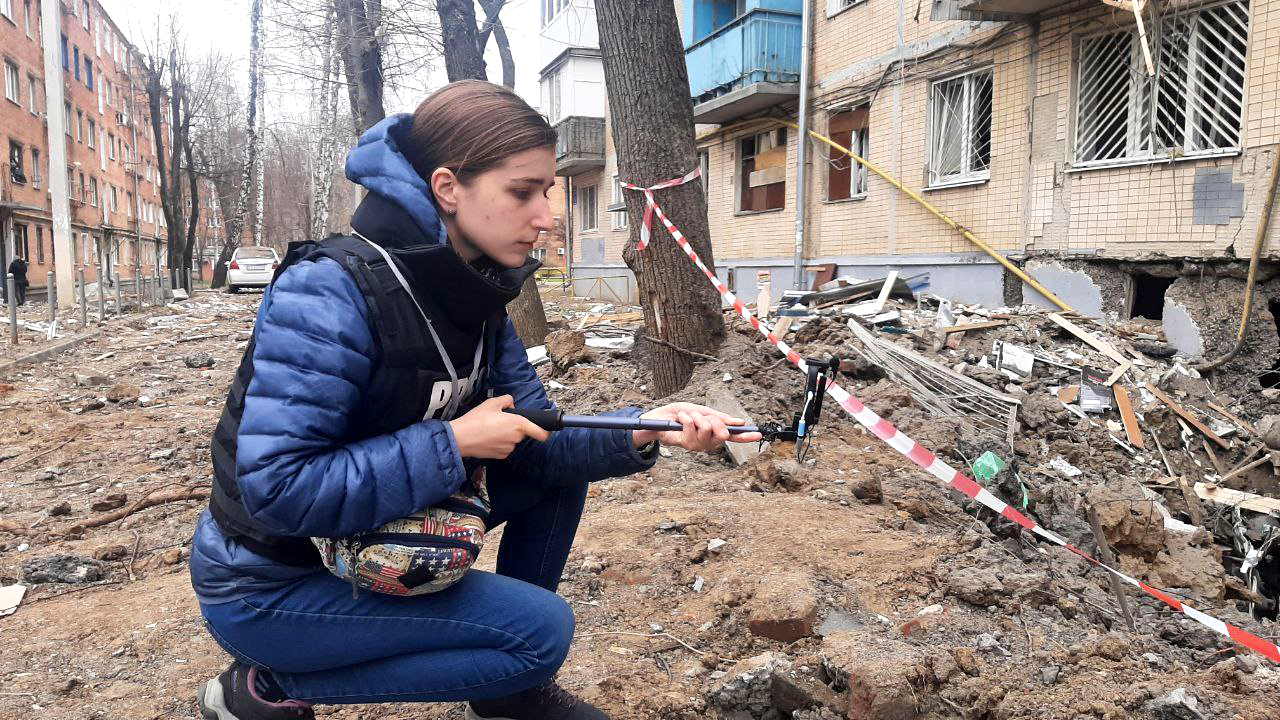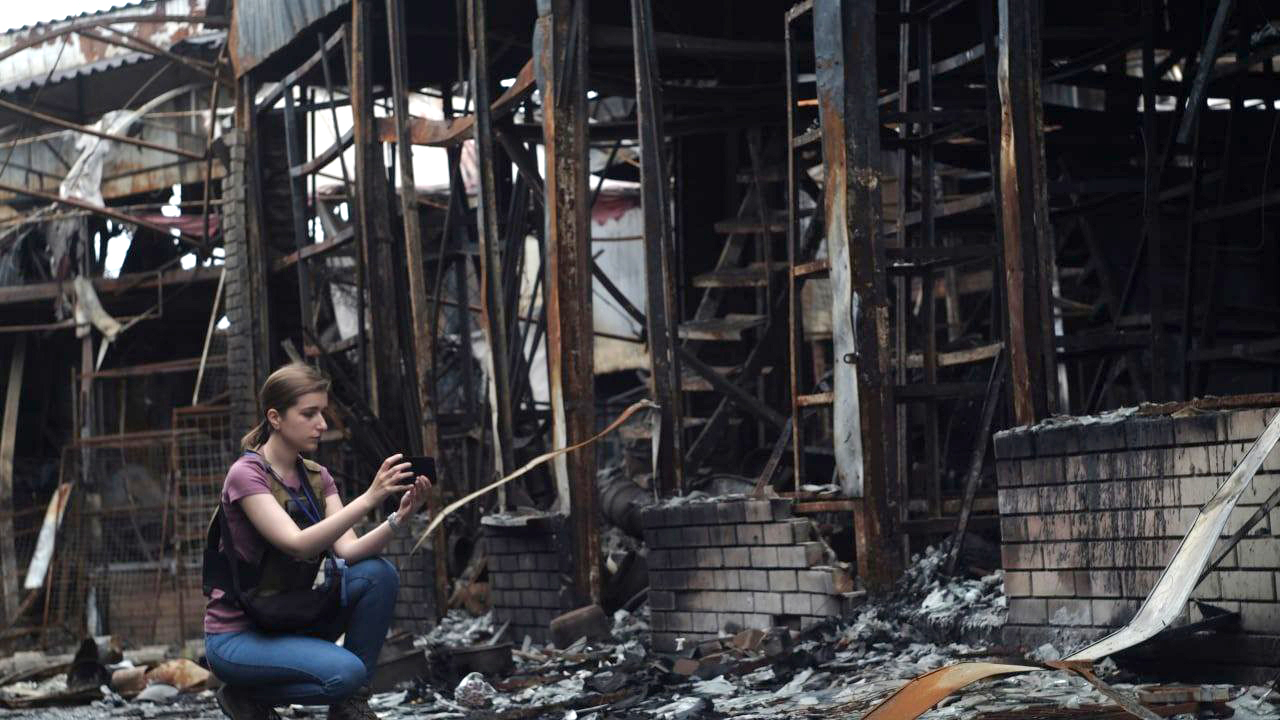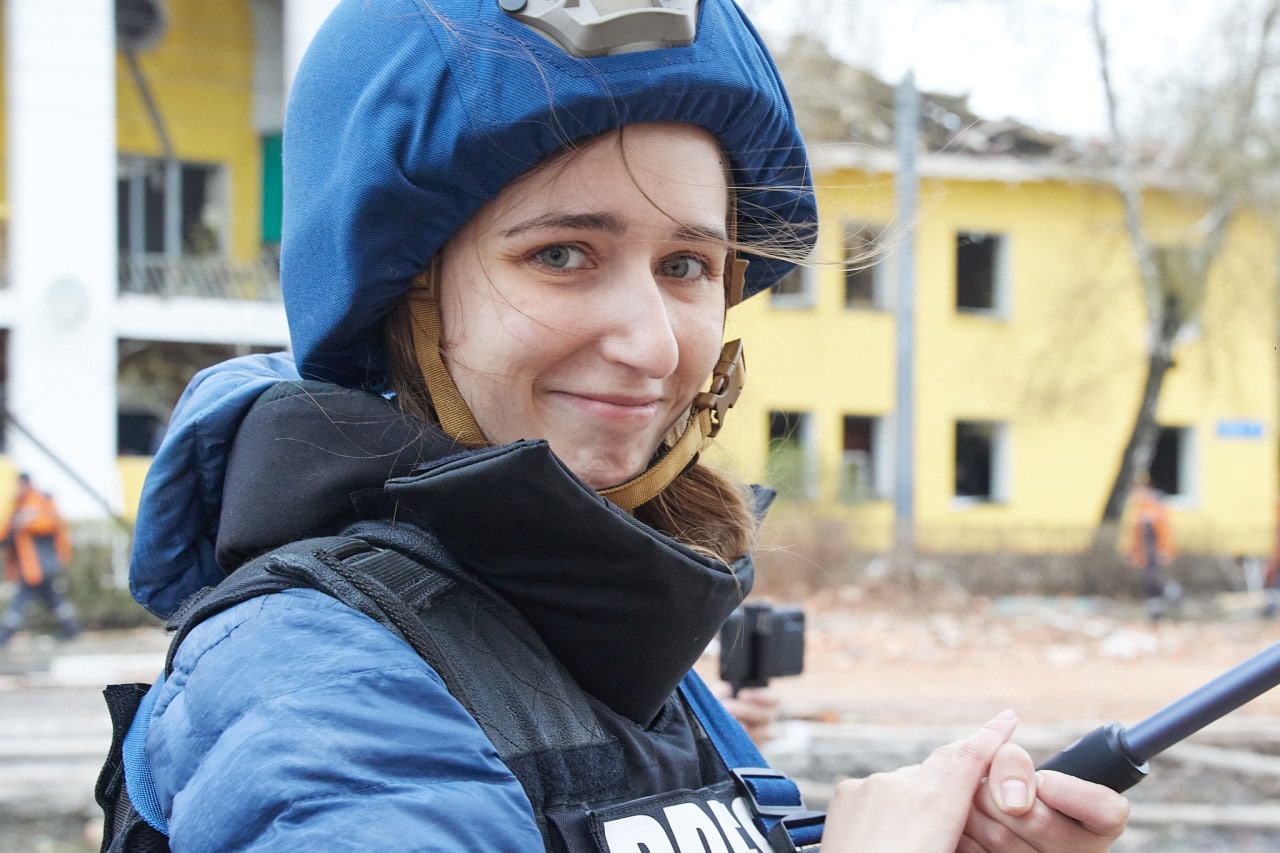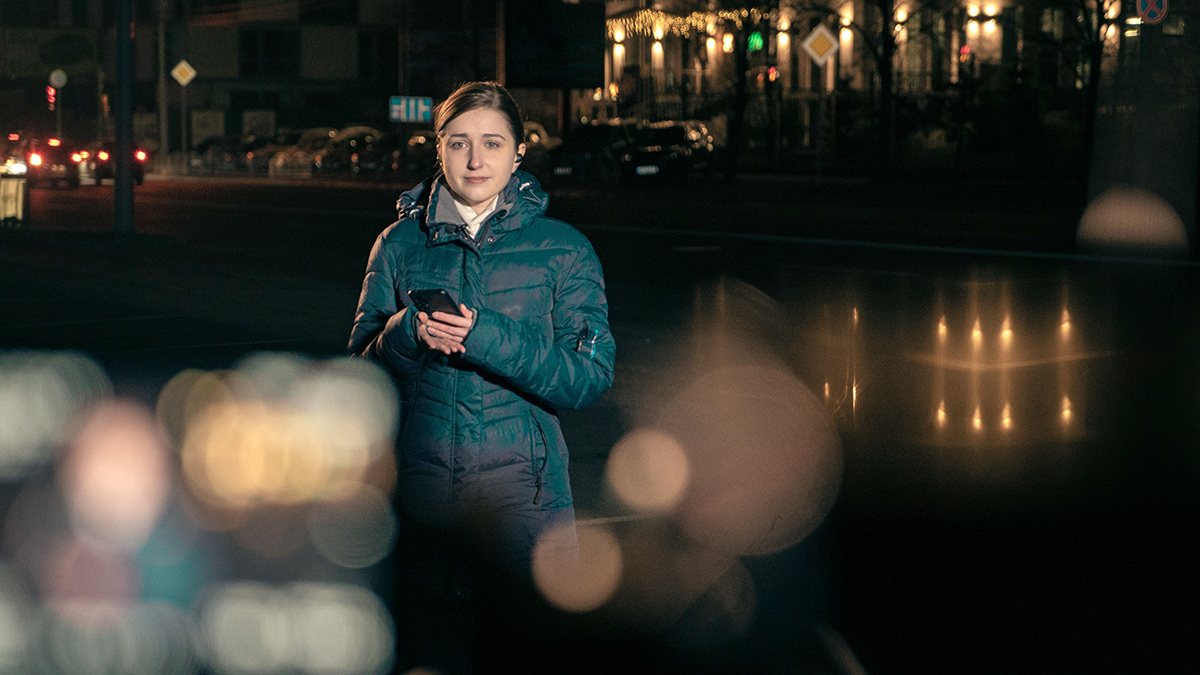Лютий 16, 2023
Олександра Новосел, Суспільне Харків: «Бачу життя, попри війну»
16 лютого Україна відзначає День військового журналіста — людей, котрі поруч із танкістами, десантниками, морпіхами, артилеристами в найгарячіших місцях українського спротиву. З 2014 року та з лютого 2022-го частина українських медійників, сама того не обираючи, стала воєнними кореспондентами. Одягнувши амуніцію та прихопивши робоче спорядження, вони вирушили працювати на війну.
Суспільне Мовлення розпочинає цикл матеріалів-блогів, у яких наші журналісти ділитимуться своїм досвідом роботи у небезпечному середовищі.
Олександра Новосел — лінійна продюсерка Суспільне Харків. Працює кореспонденткою та висвітлює війну у Харкові та області. З перших днів повномасштабної війни й до сьогодні — Саша на інформаційній передовій. 16 січня 2023 року отримала нагороду від Національної ради.
Читайте також: Шеф-редактор Суспільне Харків Слава Мавричев — про команду та рік повномасштабної війни
Мені важко називати себе воєнною кореспонденткою. Як на мене, це специфіка професії: я ж 24 лютого опинилася на війні у себе вдома, в Харкові.
 Прокинулася від вибухів і пішла працювати
Прокинулася від вибухів і пішла працювати
Раніше я працювала редакторкою та ведучою в Харкові. Ми знімали цивільні теми, збирали випуски новин, готували міжпрограмки, але від початку повномасштабного вторгнення до студії я поки не повернулася — треба було працювати в полі.

Харків, квітень 2022 року. Наслідки удару «Смерчу» по житловому будинку
Перші дні ми всією командою знімали навкруги біля своїх домівок та укриттів. Власне, я тоді пішла зранку до найближчої станції метро й вже звідти включилася в ефір, ще не було навіть 7-ї. Потім вже їхала туди, куди було потрібно. Харків у лютому-квітні — це була зона бойових дій, постійні обстріли. Ми їхали туди, куди було можливо й потрібно, але мали й певний плюс: більше не треба було перейматися пошуком тем. Показувати все життя навколо — це важливо, важливо для людей.
Знімати зони обстрілів треба тільки тоді, коли відчуваєш, що можеш це витримати й зреагувати правильно. Правильно — це вчасно впасти, не їхати в зону явної небезпеки, вчасно поїхати з місця «прильоту» й не потрапити під повторний обстріл. Якщо я відчуваю, що не витримаю — не їду.
Ризики є в житті в Харкові: місто прикордонне й ракетні удари тут регулярні. Фактично, це постійний ризик, але для мене це свідомий вибір. Основне правило, яке встановив наш шеф-редактор:
 Жоден репортаж не вартує життя журналіста
Жоден репортаж не вартує життя журналіста
Ми не ризикуємо просто так, не вражаємо заради того, щоб просто вразити глядача. Не спекулюємо на темі війни. У кожного кореспондента є колега, який стежить за часом виїзду, часом виходу на зв’язок та часом повернення. Кожен з нашої команди, хто працює хоча б у потенційно небезпечній зоні, пройшов курси тактичної медицини й може користуватися аптечкою.
Весь час працюю у Харкові та Харківській області. Це великий регіон і ситуації тут різні. Є вже відносно безпечні деокуповані зони, як-то Ізюм, а є прикордоння та Куп’янський напрямок, де й зараз тривають бойові дії. Той самий Куп’янськ, наприклад, щодня під обстрілами, окупанти залишили місто у березні, а тепер рівняють його із землею, люди втомлені, багато хто виїздить.

Харків, червень 2022 року. Згорілий ринок «Барабашово»
Одна з найсильніших зйомок — перша евакуація людей у травні — тоді відкрили піший перехід і ті люди… Люди, які йшли пішки із дітьми повз десяток блокпостів росіян, йшли попри обстріли, щоб бути вдома. Це дуже важко емоційно — важко бачити й водночас радісно — вони вдома.
Ще одна із таких історій була в червні: я поїхала на Північну Салтівку, на той час в один з найнебезпечніших районів міста, а «Смерч» росіян прилетів неподалік мого будинку, вперше. Тоді загинуло 5 літніх людей, поранення отримали діти. Я живу в районі, який вважався відносно безпечним, люди тут виходили надвечір посидіти у дворі, у дворі й загинули. Тоді я дуже чітко відчула, що росія — це країна терорист, бо вбивала вона літніх і дітей, які не становили для неї загрози. Вбивала заради вбивства. Тоді ж до мене підійшла жінка, вона шукала свого чоловіка, тож, попросила показати їй фото загиблих. Коли дивилася, попросила потримати її за руку, сказала, що боїться втратити свідомість, якщо впізнає. По фото вона його не впізнала, пізніше смерть їй підтвердили за документами.
 Мені не потрібна якась окрема мотивація. Це мій дім, моя країна
Мені не потрібна якась окрема мотивація. Це мій дім, моя країна

Харків, березень 2022 року. Наслідки ракетного удару по житловій вулиці
Росіяни окупували дім моїх батьків, і я хочу, щоб вони відповідали за свій злочин, кожен. Моя робота — показувати правду про те, що тут робить росія. Не один путін — кожен з сотень тисяч їхніх солдатів! — це всі вони скоюють злочин. Злочин, про який тепер не забудуть. Інтернет не стерти у світі й не заборонити. Тож через десятки років по запиту «Ізюм» так само можна буде побачити зроблені нами світлини масових поховань та руйнацій, а це означає відповідальність для кожного, хто стріляв, подавав снаряд, катував, копав окоп чи забезпечував окупаційну логістику. Я хочу вірити в трибунал.

Харків, січень 2023 року. Включення в марафон «Єдині новини»
 Я не хочу забувати
Я не хочу забувати
Війна стала частиною нашого життя, але ми виживемо й переможемо. Ми маємо все це відбудувати, відновити, але «без вас», як кажуть. Найбільше запам’ятались люди: у цих великих містах і малих селах, голодні, втомлені, але справжні. Кожна їхня історія — безцінна. Коли в мене питають: «Як ти це витримуєш?», кажу: «Я бачу життя, попри війну».
Фото — з особистого архіву Олександри Новосел.
До публікації матеріал підготували Євгенія Шаламова та Христина Купльовська.
Oleksandra Novosel, Suspilne Kharkiv: “I see life despite the war”
On 16 February, Ukraine celebrates the Day of the Military Journalists, the people who are alongside tankers, paratroopers, marines, and artillerymen in the hottest spots of the Ukrainian resistance. Since 2014 and since February 2022, some Ukrainian media professionals have become war correspondents without choosing to do so. Putting on their ammunition and grabbing their work equipment, they went to work at the war.
Suspilne Ukraine is launching a series of blogs in which our journalists will share their experience of working in a dangerous environment.
Oleksandra Novosel is a line producer at Suspilne Kharkiv. She works as a correspondent and covers the war in Kharkiv and the region. From the first days of the full-scale war to the present day, Sasha has been on the information frontline. On 16 January 2023, she received an award from the National Council.
Read also: Slava Mavrychev, Editor-in-Chief of Suspilne Kharkiv, about the team and a year of full-scale war
It's hard for me to call myself a war correspondent. For me, this is the specificity of the profession: on 24 February, I found myself at war at home, in Kharkiv.
"I woke up to explosions and went to work"
I used to work as an editor and presenter in Kharkiv. We were filming civilian topics, assembling newscasts, preparing inter-programmes, but I haven't returned to the studio since the start of the full-scale invasion - I had to work in the field.

Kharkiv, April 2022. The aftermath of Smerch's strike on a residential building
In the first days, we filmed as a team around our homes and shelters. In fact, I went to the nearest metro station in the morning and started broadcasting from there, before it was even 7 o'clock. Then I drove to where I needed to go. Kharkiv in February-April was a war zone, with constant shelling. We went wherever it was possible and necessary, but we also had a certain advantage: we no longer had to worry about finding topics. Showing the life around us is important, it is important for people.
You should film the areas of shelling only when you feel that you can withstand it and react correctly. The right thing is to fall down in time, not to go to the zone of obvious danger, to leave the place of the strike in time and not to come under repeated fire. If I feel that I can't take it, I don't go.
There are risks in living in Kharkiv: it is a border city and rocket attacks are regular. In fact, it is a constant risk, but for me, it is a conscious choice. The main rule set by our Editor-in-Chief is:
"No report is worth a journalist's life"
We don't take risks for nothing, we don't impress for the sake of impressing the viewer. We do not speculate on the topic of war. Each correspondent has a colleague who monitors the time of departure, the time of contact and the time of return. Everyone from our team who works at least in a potentially dangerous area has taken tactical medicine courses and can use a first aid kit.
I work in Kharkiv and Kharkiv region all the time. This is a large region and the situations here are different. There are already relatively safe de-occupied areas, such as Izium, and then there are the border areas and the Kupiansk direction, where fighting is still going on. Kupiansk, for example, is under fire every day, the occupiers left the city in March and are now razing it to the ground, people are tired, many are leaving.

Kharkiv, June 2022. The burnt-out Barabashovo market
One of the most powerful shots is the first evacuation of people in May, when the pedestrian crossing was opened and those people... People who walked with their children past a dozen russian checkpoints, walked despite the shelling to be home. It's very difficult emotionally - it's hard to see and at the same time joyful - they are home.
Another such story was in June: I went to North Saltivka, one of the most dangerous areas of the city at the time, and a russian Smerch arrived near my house for the first time. Five elderly people were killed and children were injured. I live in a neighborhood that was considered relatively safe, and people came out in the evening to sit in the yard, and they died in the yard. Then I felt very clearly that russia was a terrorist country, because it was killing the elderly and children who did not pose a threat to it. It was killing for the sake of killing. At the same time, a woman came up to me, she was looking for her husband, so she asked me to show her the photos of the dead. When she was looking, she asked me to hold her hand, saying that she was afraid she would faint if she recognized him. She did not recognize him from the photo, and later his death was confirmed by documents.
"I don't need any particular motivation. This is my home, my country"

Kharkiv, March 2022. The aftermath of a missile strike on a residential street
The russians occupied my parents' house, and I want them to be held accountable for their crime, each and every one of them. My job is to show the truth about what russia is doing here. It's not just putin, it's every single one of their hundreds of thousands of soldiers - they are all committing a crime. A crime that will not be forgotten. The Internet cannot be erased or banned in the world. So, in decades to come, the photos of mass graves and destruction that we took will be available on the Izium search engine, and this means accountability for everyone who fired a shot, fired a shell, tortured, dug a trench, or provided occupation logistics. I want to believe in the tribunal.

Kharkiv, January 2023. Joining the United News marathon
"I don't want to forget"
War has become a part of our lives, but we will survive and win. We have to rebuild and restore everything, but “without you”, as they say. What I remember most are the people: in these big cities and small villages, hungry, tired, but real. Each of their stories is priceless. When people ask me: “How do you stand it?”, I say: “I see life despite the war.”
Photo from the personal archive of Oleksandra Novosel.
The article was prepared for publication by Yevheniia Shalamova and Khrystyna Kuplovska.


